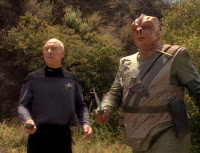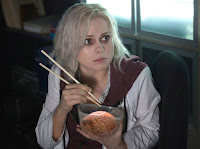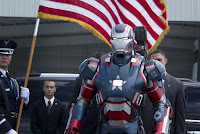This week I wanted to blather for a minute about an unusual character/structure issue that I see come up now and then. It’s one of those kinda basic ideas that can actually be difficult to spot. Or explain. And, to be honest, it’s something I’m dealing with a bit in my current book.
I’ve talked before about protagonists. How my main character should be the main focus of the story, the ones we’re spending the most time with. Secondary characters should be secondary. Background characters should kinda blur into the background. This all sounds straightforward, right? I think we all understand this.
However…
A mistake I sometimes see is when every other character in the story immediately recognizes this character as the protagonist. They all stop doing their own, natural thing and start treating the main character as… well, the center of things. The character stops moving through the plot, and instead the plot begins to revolve around them.
Let me give you an example…
 A few weekends back, one of my random movies was about a guy (we’ll call him Yakko) who wanted to propose to his girlfriend. Had the ring and everything. Thing was, said girlfriend got roped into being in charge of some office team-building thing up in the mountains. She had to cancel their plans for the weekend, unless… He was an experienced camper/hiker and he had a big SUV—if he wanted to drive they could still kinda spend the weekend together. Yakko thinks about it, decides sure, he can propose up by the lake, and agrees to help out.
A few weekends back, one of my random movies was about a guy (we’ll call him Yakko) who wanted to propose to his girlfriend. Had the ring and everything. Thing was, said girlfriend got roped into being in charge of some office team-building thing up in the mountains. She had to cancel their plans for the weekend, unless… He was an experienced camper/hiker and he had a big SUV—if he wanted to drive they could still kinda spend the weekend together. Yakko thinks about it, decides sure, he can propose up by the lake, and agrees to help out. Thing was… as soon as their group got together and started driving up into the mountains, everyone started to defer to Yakko. All the office folk who’d never met him before. That jerk Evan from accounting. Even his girlfriend, the one who was supposedto be in charge. Suddenly the protagonist was the boss and nobody questioned it… or even mentioned it.
This isn’t really surprising, on one level, that writers end up doing this. If I want my character to be active and do things, they need to be in a position to do things, right? Their decisions need to count and have an effect on the plot. There’s a reason most of the Star Trek shows are about command officers and not the enlisted crew. It’s tough to be active when everything about my position requires me to defer to someone else.
 Of course, the answer to this isn’t for me to have the unconnected boyfriend suddenly become the key figure on the teambuilding trip. Or for the junior crewman to take command of Deep Space Nine. Just because someone’s the center of attention in my story doesn’t make them the center of attention in theirstory. There’s other stuff going on in the world and structures in place. The wheels are in motion, as some folks like to say. I may focus my story on an Army private, but that doesn’t mean suddenly everyone in the military should defer to that private just because she’s the protagonist. The Army has a whole chain of command that would… well, kinda stop that from happening.
Of course, the answer to this isn’t for me to have the unconnected boyfriend suddenly become the key figure on the teambuilding trip. Or for the junior crewman to take command of Deep Space Nine. Just because someone’s the center of attention in my story doesn’t make them the center of attention in theirstory. There’s other stuff going on in the world and structures in place. The wheels are in motion, as some folks like to say. I may focus my story on an Army private, but that doesn’t mean suddenly everyone in the military should defer to that private just because she’s the protagonist. The Army has a whole chain of command that would… well, kinda stop that from happening. How often in your own life have you had something to do, something important to say, and people just brushed you off or ignored you or talked over you? It’s happened to me countless times. Hell, it just happened yesterday on the phone with the bank. It’s my life, but for some reason everyone else refuses to treat me as the most important person in it.
Now, I can already hear people typing frantically in the comments, ready to explain three or seven ways that everyone in the US Armed Forces could end up deferring to a private. And sure, it could happen. Anything could happen. That’s the joy of fiction.
But…
Y’see, Timmy, if I’m going to do it, that explanation has to be part of my story. It can’t be something that just happens, that I gloss over. That’s lazy writing. That’s me writing myself into a corner and then smashing a hole in the wall rather than figuring a way out.
I’ve talked about a similar idea before—the idea that I’m telling the right story. It’s a weird idea, I know, but if I’ve set up a situation that requires a lot of stretching of conventional norms… well, I have to explain that stretching. Why are we all deferring to the boss’s boyfriend? Who put that crewman in charge of the Defiant? Why is the general insisting everyone follow the private’s orders?
Is my main character someone who’s going to be able to navigate my plot? Is their social status, financial status, employment, or health going to be an unbelievable (or maybe flat up impossible) hindrance to the story I’m trying to tell? If they aren’t, I’m probably going to need to explain or justify a lot of things.
Or maybe I’m just focusing on the wrong person.
In my current project, the main character is the fish out of water. My ignorant stranger. She’s the new kid on the job, and this means she’s pretty far down the totem pole. So… why does she end up in the important meetings once the crisis occurs? How is she an active person, making decisions that affect the story when there are so many people above her making their own decisions?
It’s taking a bit of work. But I’m making it happen. Hopefully in a believable way.
Next time, I wanted to talk about the creepiest thing I’ve ever seen.
Until then… go write.










